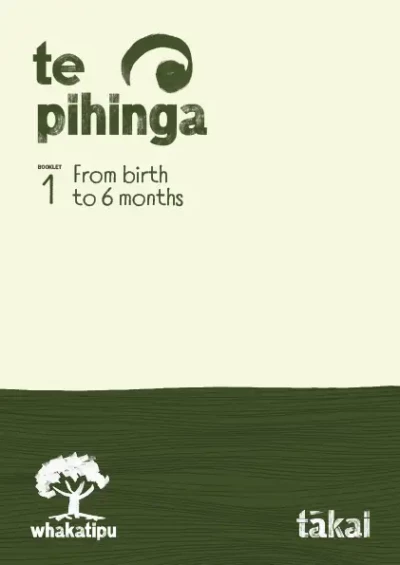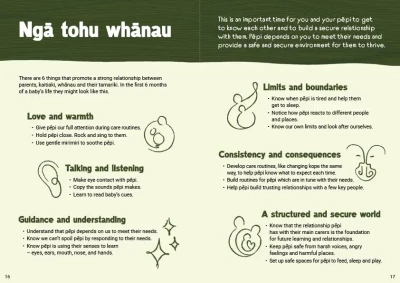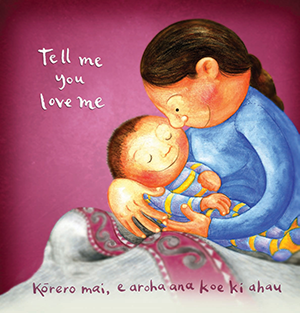Speaker 1: Sometimes I'll read a book, he'll fall asleep but when I sing he cries, I'm like "okay, okay". He doesn't like me singing, but his dad he loves, like his dad talks to him all the time.
[Text on screen: Nanaaki Pēpē | Settling babies to sleep]
Dr. Bronwyn Sweeney:
Kia ora, I'm Bronwyn Sweeney, I'm involved in sleep research. I’m a psychologist and I'm a childbirth educator.
[Text on screen: Bronwyn Sweeney, MClinPsych, PhD, MNZCCP | Clinical Psychologist]
Dr. Bronwyn Sweeney:
So I work a lot with families and parents and mums and dads and everybody. And we've just had a brilliant get-together of some mums, some dads, grandparents and pēpē, talking about sleep and their families and how sleep happens and what's important for them about sleep, and some of the important factors for sleep. It's been great.
[Text on screen: This information is especially relevant for the first six months of pēpē’s life and can help set families up for future sleep health]
Dr. Bronwyn Sweeney:
So I think one of the most important things that’s changed about sleep for babies in the last thirty years is how much we know about keeping babies safe in their sleep and so we have some key things that we really want to encourage families to do and the first ones are around the environment.
[Text on screen: Eliminate smoking in pregnancy and protect baby with a soke free from whānau, whare, and waka]
Dr. Bronwyn Sweeney:
So having a smoke free environment for pēpē. We want to encourage breastfeeding if that’s possible in that family.
[Encourage and support breastfeeding and gentle handling of baby]
Dr. Bronwyn Sweeney:
And then the baby's sleep space. So, baby having their own space to sleep in on their back, is really critical having -
[Text on screen: Position baby flat on their back to sleep - face clear of bedding.]
Dr. Bronwyn Sweeney:
- babies sleep on their back in their own space for every sleep and that could be in a bed, in a wahakura or a pēpē pod, or some arrangement like that.
[Text on screen: Place baby in their own baby bed in the same room as their parent or caregiver.]
Dr. Bronwyn Sweeney:
And keeping their sleeping space free of loose things, blankets, ties, toys, those kinds of things. If we can do that for babies, we're doing a really great step towards keeping them safe.
[Text on screen: Healthy Mama, Healthy Pēpē | It takes a village to raise a baby]
Speaker 1:
When I put him in the bassinet, I'm able to not just rest, but to do other things that I would like to do in the house or kind of do the things that I would like to do. So, it really helps and it helps in terms of your own self care too ‘cause you want to remove. I remember my husband had to move him to another room because he's like "you need to rest" and actually, you become too clingy. Because it is our first child, I want to be there all the time but at the same time, taking care of yourself is important, so it helped me as well to take care of myself.
Speaker 2:
We all do our own bits and pieces here and there I think. Sometimes I will come home from work and baby is standing in the doorway with Harley Cruz, so I know she's had a hard day, so that's that. Take him, play with him, feed him, bath him. If she's stressed out and I'm tired, we just point to Papa over there and hand him off and then these two they walk him, play with him, and sit in his room.
Speaker 3:
He's often in his room.
[Text on screen: Playing and involving pēpē in family life during the day may help them sleep at night.]
Speaker 2:
Yeah, we all play little parts and bits and pieces.
Speaker 3:
Just pass him, pass him like that.
Speaker 2:
There's bound to be one out of five of us that is happy and will hold him and play with him and yeah.
Speaker 3:
It's the village.
Speaker 2:
Yeah, actual village.
Speaker 4:
It's the communication aye? Like, I think it's the best, not only verbally but non-verbally too. If she sees that I come home from work and I'm tired or if I come home and see that she’s tired, then we both try and step up and have baby here and there, and if Nana's good, then off to Nana.
Speaker 5:
So my husband and I are both full time working, so when we both get home it's just tag, you're it. But my Mum and my son, my son's 11, they're really big help as well. So Mum's always around, she does drop off and pick ups from daycare. Yeah, she's really helpful. And then my son is her, puts her to sleep, he's good at putting her to sleep.
Speaker 1:
It's really helpful having grandparents around; they can read without even, like they can read you really well. And my husband is working full time and so, but it was good because I had a full month, we were both able to do things equally and on the first night it was so funny 'cause my husband was like "this is so hard." He didn't like the reality of the sleep deprived, is like real. We shared those responsibilities together.
Speaker 3:
It's amazing how much babies read aye, like stress, if you’re stressed and if you’re angry
they can feel that and it goes through them, it's amazing, I’ve seen it, its like, wow.
Speaker 2:
Like daily in our house, aye?
[Text on screen: Importance of sleep for mental wellbeing and child development.]
Dr. Bronwyn Sweeney:
So we know that when babies have good sleep when they need it, it helps them learn
so it helps them learn language and skills, how to use their bodies, it helps their hearing develop, it helps their sight develop, every aspect of them it helps develop. So every aspect actually of our mental and physical well-being and health is affected by sleep. It's something we don't get taught, but it's super super important for babies to have that sleep.
Often, you know, Mum and baby are the most connected in the family but it could be Nanny, could be somebody else who's really so, whoever's doing that primary caring, they're going to be impacted the most by the baby's sleep when we're not sleeping well, our physical health can be impacted but mental health as well.
I guess all of us would say when we've slept well, we feel better, we can concentrate more, we have more fun so it's important that baby’s sleeping as well as possible, so Mum and everybody else can sleep well and then that Mum's got plenty of opportunities to sleep as well.
Speaker 1:
I've noticed that too, the more sleep, the more I feel like he's growing more and he's like more alert and more aware. I just notice the changes in his features and the way he responds to you, to food and what's happening around him. That’s been my experience.
[Text on screen: Variability and Uniqueness: Sleep routines and settling pēpē]
Dr. Bronwyn Sweeney:
In the early weeks it's kind of 'do what works' for everybody. When you've just had a baby, everybody’s tired, you're trying to figure out feeding, you're trying to figure out being a parent or an expanding family so anything that works in the first few weeks I think is a good idea.
And then once we get through the initial kind of six or eight weeks and the baby's body clock and it's systems start to come online, it's sleep systems start to develop and come online,
then we can help baby to have more of a routine.
[Text on screen: Signal to baby it’s time to sleep]
Dr. Bronwyn Sweeney:
Things like doing a bath and then a feed or story or singing, lullabies, massage, all of those things, if they can be incorporated kind of regularly each night so baby kind of knows that sleep's coming and this is what we do and this is how we wind down for the day and it's nice and calm and cuddly up together, then that can all help as well. Yeah.
It's perfectly normal for babies to sleep different amounts and also for the same baby to sleep different amounts on each day, so they're not necessarily going to sleep the same amount every day. I don't sleep the same amount every day, just like I don't eat the same amount every day. So, baby isn't going to sleep the same amount, in the same way, every day.
So just being able to flow with it and I think the most constant thing about babies and their sleep is change. So just when you think you've got it sussed and you're in a bit of a pattern
something will happen, the seasons will change or they'll get some teeth or those kinds of things, and it will change. So being prepared for that and just having expectations that it will change and keep adapting with it.
Speaker 3:
I can sleep through an earthquake, so he doesn't bother me and my snoring doesn't bother him either, so we good.
Speaker 6:
During the day, he probably sleeps up to two hours, during the day. But at night he only wakes up once. So his sleep varies from four to five hours now, he started off three hours though. So, I guess the older they get the longer they are starting to sleep, so I'm happy.
Speaker 4:
I guess when he's sleeping in his bassinet, as much as you do want to try and hold him all the time, you do just let him sleep and make sure that oh okay, this is his time where he's growing. Making sure that his, whatever he's developing physically or internally, make sure it just happens and try not to disturb it.
Speaker 2:
We try and bath him most every night, get into that routine of keeping him up, playing with him, bathing him, changing him, he has better, longer sleeps that way, he really does, from an off night of just skip the bath, bottle and bed kind of thing, yes, talking about you. Yeah.
Speaker 1:
Now that we're getting used to his sleeping and routine we kind of know already what time he'll sleep, what time he'll wake up and the things that will help us calm ourselves down is like, yeah, when things get hard, we bath him as well, we like, sing songs, tell stories, read books.
Speaker 4:
It's sort of like a natural forming routine, that, as soon as you know that someone’s not here, or if I know that she needs to be somewhere or needs to do something, then we just step up but yeah. Feed, sleep, bath and we know if baby sleeps, she tries to get rest or vice-versa.
Speaker 1:
Yeah, it's a definite learning process, aye. Like it just went, I think for us it was like naturally, our routine naturally came, according to him, and so now we kind of know yeah like, we don't talk to him at night, he just eats and goes straight to sleep at night and during the day, because I'm home most of the time, I know when he's hungry, know when he wants to sleep. And I do have a lot of visitors, cause I'm an extrovert. I love having people over and so, I kind of know, "oh come at this time, because this is when he sleeps." So I kind of know when he needs to sleep, cause I want to make sure he sticks to that sleeping pattern.
Speaker 3:
A lot of it was from our kids, aye honey?
Speaker 2:
Yeah.
Speaker 3:
What we've done with them. We try and implement that with our moko.
[Text on screen: Some babies settle themselves, others need cuddles.]
Speaker 2:
I let him go to sleep on his own, I won't rock him or walk him around or let him fall asleep in my arms. I try and make him, you know, sleep on his own. That's how I, we did our boys and that's the only way I know, but I know it's different for Baby cause she's got him the majority of the time. And then daytime is awake time, I'll talk to him, I'll play with him, I'll unbind him, I'll wipe his face, change his clothes, you know this is, this is daytime, this is our awake time.
So this, that's the only thing I'm trying to do at the moment.
Speaker 6:
His Nana sings, when she puts him to sleep. The only way that she knows how to put him to sleep, she sings Samoan lullabies to him and that's you know, her bonding time with him and I don't want to take that away. I don't want to have to sing those songs cause I know I want him to grow up and be able to cherish those songs with his Nana.
After his baths, I try to, I guess, I got that from my Nana, so my Grandma, she's Tongan and she kind of told me every time after I finish bathing him or even when he finishes having a shower with his Dad, I'll massage his legs and his arms. And she said it's more sort of just stretching out his legs and making sure cause he's so used to bending them and he doesn't stretch them on his own. Yeah, so that's one thing I've taken from my Nana, is to just massage him and he likes it, especially when he's lying on his tummy, he's getting the whole full body massage for free.
Speaker 5:
Yeah we listen to music a lot. We listen to a lot of music so she's around music, she sleeps through music. When the music was on earlier, as soon as it stopped she woke up straight away. I was like "damn! what have I done?" Yeah, so she loves music.
Dr. Bronwyn Sweeney:
One of the key things for parents is to spend a lot of time in the first few weeks just being with your baby and observing your baby and you'll get to know their little ways of telling you things and giving you cues and ideas about what they need and responding to those. And to be honest, parents are the baby's best experts. They're around them the most, they know their baby, they know their family and what has to work inside their family and in their home so they're the best experts, so following your own intuition is often a really good idea.
And then if you're feeling a bit stuck or you think something's not going so well
then reach out and use the services that are available.
[Text on screen: Reach out for help]
Dr. Bronwyn Sweeney:
PlunketLine, Healthline, your GP, you know, reach out and ask trusted people in your community. It can be really good.
[Text on screen: Plunket: 0800 933 922 | Healthline: 0800 611 116]
Dr. Bronwyn Sweeney:
But also just your own support networks. Check out ideas, you know, "Is your baby doing this? my baby's doing this." Just get some reassurance, cause often that’s just what we need is to hear that our baby's kind of, in the range of what feels like regular sort of sleep development.
Speaker 1:
I feel like being a mum I found the confidence to ask for help more often, now than before, like I'll just ring Plunket or Healthline and get more advice around serious concerns. Or I've messaged like, Mums that I know like on Instagram.
Speaker 3:
Different times now aye? Got social media now and Google, back in our day we didn't have that. You just make it up on the spot.
Speaker 1:
Yeah, having sisters as well is like a big help like because I've got sisters who, to be honest when I was breast feeding him the only info that helped me was my sister's advice cause all the other advice, I had gone to classes like prenatal classes and that just went all out the window. But having info from your family is just like, cause they are constantly there, so they'll help you.
Speaker 4:
I've learned stuff off my brothers and their kids and my sister and her kids, yeah it's a bit of a passing down of knowledge.
[Music]
[Text on screen: Thank you to all the families that took part in this project. Without your input and time, this mahi would not have been possible. | A big thank you to Dr. Bronwyn Sweeney.]

 pdf 11 MB
pdf 11 MB











